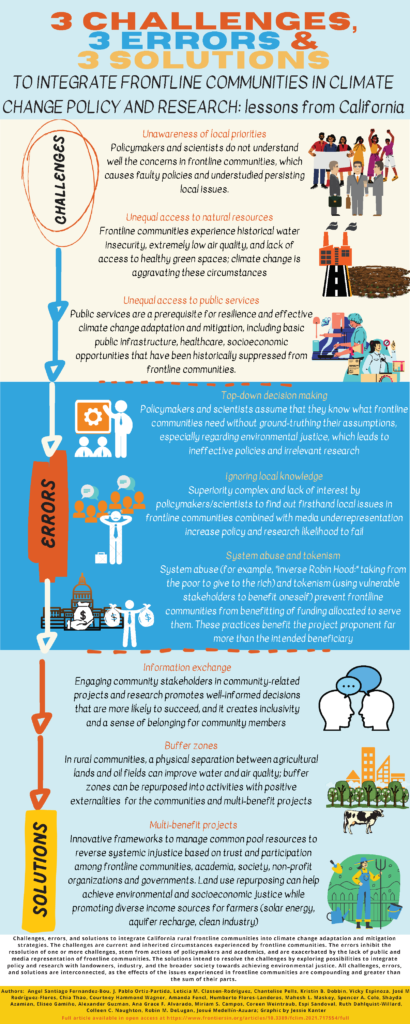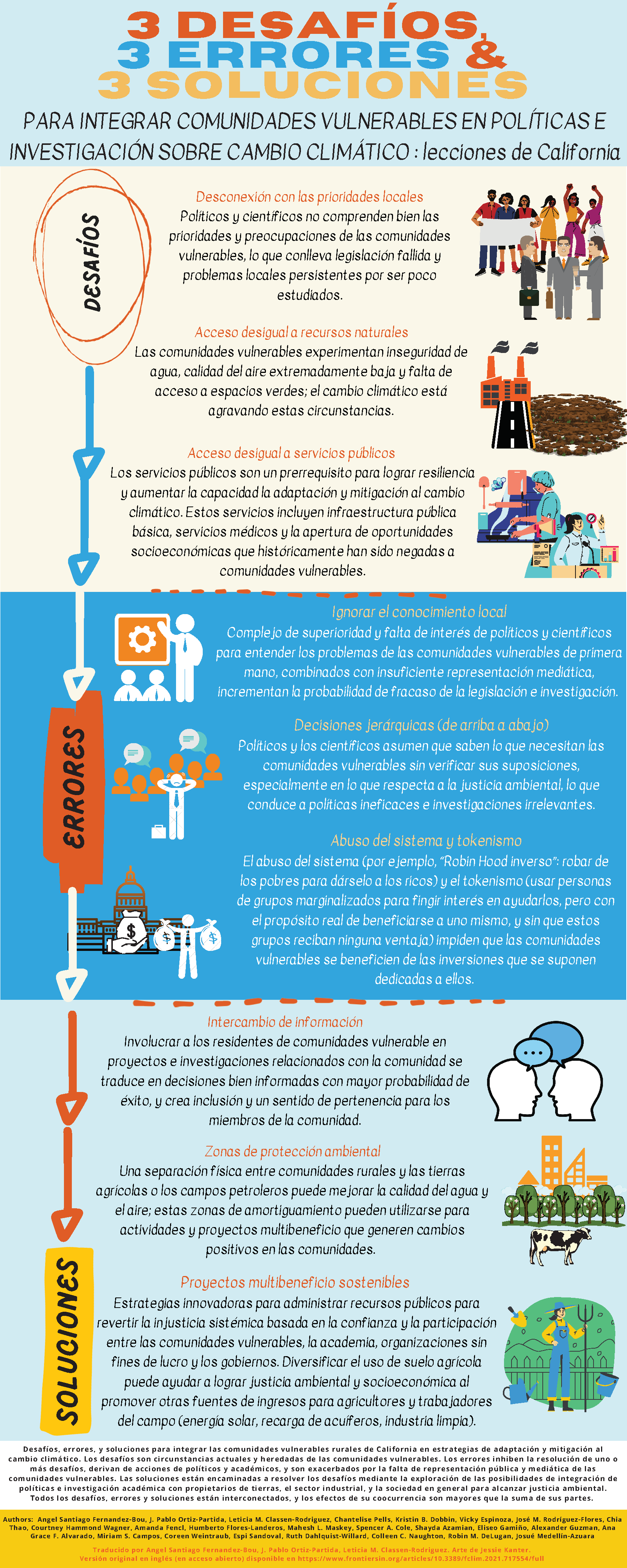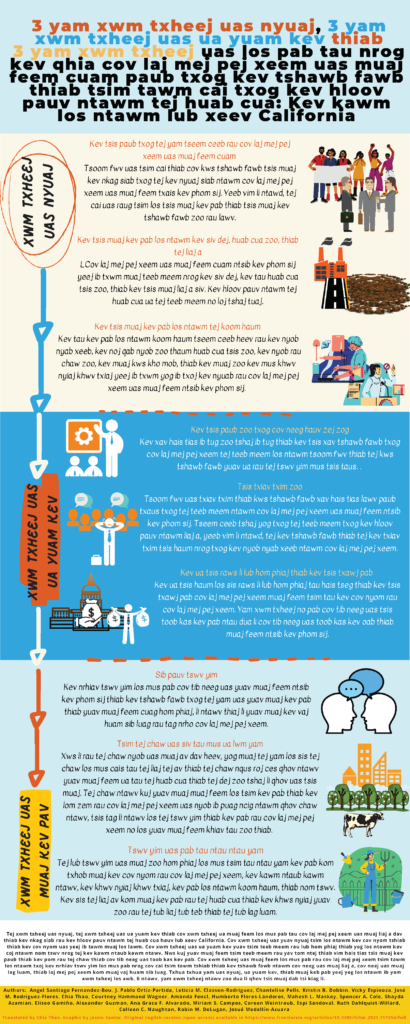3 Challenges, 3 Errors, and 3 Solutions to Integrate Frontline Communities in Climate Change Policy and Research: Lessons From California
The SEEN Team is part of a recently published scientific article about how to incorporate the perspectives, the needs, and the concerns of disadvantaged communities into scientific research and policy. The team has put together a summary with three challenges, three errors, and three potential solutions. The challenges are current and inherited circumstances experienced by frontline communities. The errors inhibit the resolution of one or more challenges, stem from actions of policymakers and academics, and are exacerbated by the lack of public and media representation of frontline communities. The solutions intend to resolve the challenges by exploring possibilities to integrate policy and research with landowners, industry, and the broader society towards achieving environmental justice. All challenges, errors, and solutions are interconnected, as the effects of the issues experienced in frontline communities are compounding and greater than the sum of their parts.
Read the paper for free (Open Access) on https://www.frontiersin.org/articles/10.3389/fclim.2021.717554/full
The authors also created an infographic and translated it to Spanish and Hmong.
Documents in PDF:
- infográfico Español_3 desafíos, 3 errores, y 3 soluciones
- infographic English_3 challenges, 3 errors, 3 solutions
- infographic Hmong_3 challenges, 3 errors, 3 solutions
Abstract:
Frontline communities of California experience disproportionate social, economic, and environmental injustices, and climate change is exacerbating the root causes of inequity in those areas. Yet, climate adaptation and mitigation strategies often fail to meaningfully address the experience of frontline community stakeholders. Here, we present three challenges, three errors, and three solutions to better integrate frontline communities’ needs in climate change research and to create more impactful policies. We base our perspective on our collective firsthand experiences and on scholarship to bridge local knowledge with hydroclimatic research and policymaking. Unawareness of local priorities (Challenge 1) is a consequence of Ignoring local knowledge (Error 1) that can be, in part, resolved with Information exchange and expansion of community-based participatory research (Solution 1). Unequal access to natural resources (Challenge 2) is often due to Top-down decision making (Error 2), but Buffer zones for environmental protection, green areas, air quality, and water security can help achieve environmental justice (Solution 2). Unequal access to public services (Challenge 3) is a historical issue that persists because of System abuse and tokenism (Error 3), and it may be partially resolved with Multi-benefit projects to create socioeconomic and environmental opportunities within frontline communities that include positive externalities for other stakeholders and public service improvements (Solution 3). The path forward in climate change policy decision-making must be grounded in collaboration with frontline community members and practitioners trained in working with vulnerable stakeholders. Addressing co-occurring inequities exacerbated by climate change requires transdisciplinary efforts to identify technical, policy, and engineering solutions.
Authors:
Angel Santiago Fernandez-Bou1,2,3*, J. Pablo Ortiz-Partida4*, Leticia M. Classen-Rodriguez3,5, Chantelise Pells1, Kristin B. Dobbin6, Vicky Espinoza2,7, José Manuel Rodríguez-Flores1,2,3,7, Chia Thao8,9, Courtney R. Hammond Wagner10, Amanda Fencl11, Humberto Flores-Landeros1,2,3,7, Mahesh L. Maskey1,2, Spencer A. Cole1,2,7, Shayda Azamian12, Eliseo Gamiño13, Alexander Guzman1,2, Ana Grace F. Alvarado2,3,7, Miriam S. Campos-Martínez9, Coreen Weintraub4, Espi Sandoval13, Ruth M. Dahlquist-Willard14, Leigh A. Bernacchi15, Colleen C. Naughton2,7, Robin M. DeLugan9, and Josué Medellín-Azuara1,2,7
- 1Water Systems Management Laboratory, University of California, Merced, Merced, CA, United States
- 2Civil and Environmental Engineering, University of California, Merced, Merced, CA, United States
- 3SocioEnvironmental and Education Network (SEEN, 4Venir Inc.), Merced, CA, United States
- 4Climate and Energy Program, Union of Concerned Scientists, Cambridge, MA, United States
- 5Department of Biology, Saint Louis University, Saint Louis, MO, United States
- 6Department of Environmental Science and Policy, University of California, Davis, Davis, CA, United States
- 7Environmental Systems Program, University of California, Merced, Merced, CA, United States
- 8Public Health Program, University of California, Merced, Merced, CA, United States
- 9School of Social Science, Humanities, and Arts, University of California, Merced, Merced, CA, United States
- 10Water in the West, Woods Institute for the Environment, Stanford University, Stanford, CA, United States
- 11Department of Geography, Texas A&M University, College Station, TX, United States
- 12Leadership Counsel for Justice and Accountability, Fresno, CA, United States
- 13Central Valley Leadership Round Table (Mesa Redonda de Liderazgo del Valle Central), Fresno, CA, United States
- 14University of California Agriculture and Natural Resources, Fresno County Cooperative Extension, Fresno, CA, United States
- 15Center for Information Technology Research in the Interest of Society and the Banatao Institute, University of California, Merced, Merced, CA, United States



